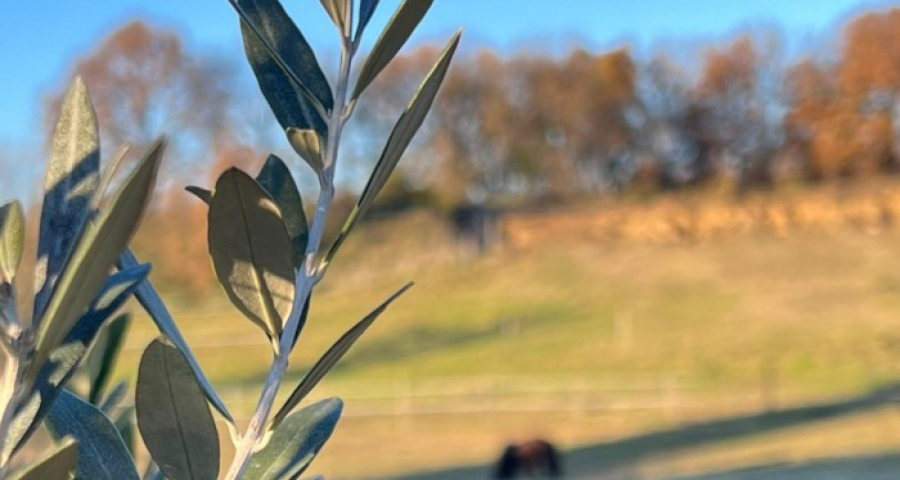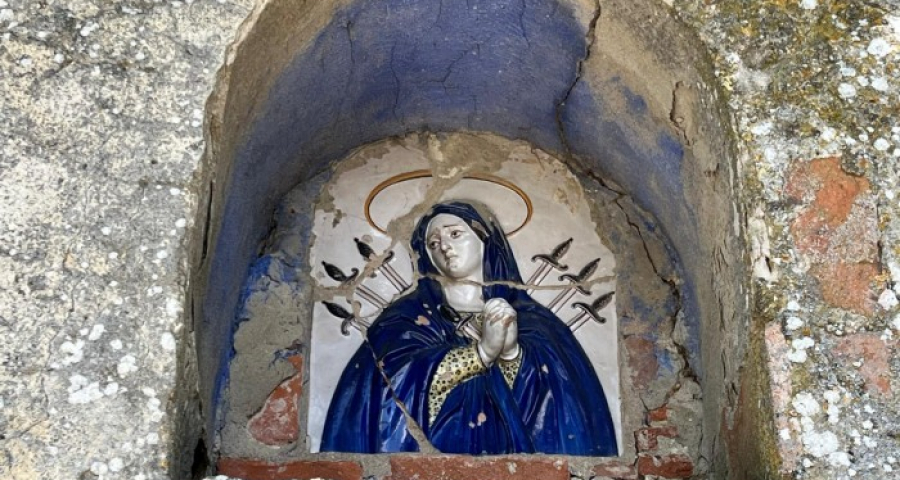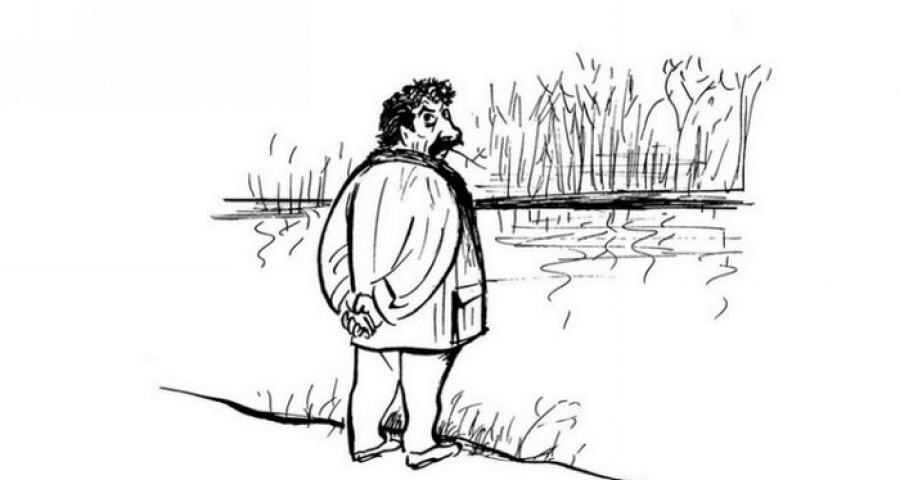Narrative Economics/11 - Peppone and Don Camillo, under the same umbrella, sitting on the bank of the river about to overflow are an eloquent image
by Luigino Bruni
published in Avvenire on 22/12/2024
«We invoke you, first of all, O Father. Beggars (accattoni) we all are indistinctly: the more begging and the more wretched, the more ravenous our culture and our dominion over the world make us. We therefore return to Thee. We hasten Thy triumph because our lives have been consumed in the desire for Thy justice. We know that You were waiting for us on our return, the return of beggars».
Ernesto Buonaiuti, Storia del Cristianesimo, III, 1943
Fraternity depends on us and above all on others. It attracts but frightens. So we keep forgetting it in the public sphere
In the exile of Monterana, those four houses lost in the middle of the mountain, don Camillo fell into a deep sadness and great melancholy: ‘Sad, the days of exile in the little village at the top of the mountain.... Jesus,’ said don Camillo to the Christ on the high altar, “it's a melancholy to go mad: nothing happens up here!”. Once again it is the dialogue with Jesus that saves him: ‘I don't understand,’ replied the crucified Christ smiling, ‘every morning the sun rises and every evening it sets, you see billions of stars rotating over your head every night, the grass sprouts in the meadows, time continues its rounds. God is present and manifest at every moment and everywhere. It seems to me that many things happen, don Camillo. It seems to me that the most important things happen' (Giovannino Guareschi, Mondo piccolo. Don Camillo and his flock, p. 249). A beautiful dialogue, which contains, once again, a wonderful lesson in popular theology. When in exile life becomes difficult, when melancholy would like to drive us ‘mad’, we need only follow the advice of don Camillo's Jesus. Christ does not speak religious words to him, he does not invite him to pray more and better, or to engage in asceticism, or to become more good. No: he speaks to him of life, of the sun, of stars, of grass, of time. He invites him to rediscover the joy of life by looking at the world - life was there, within the small, earthly things. If life loses its meaning and interest, it does not return by seeking it on a religious level: the joy of living must be reactivated. But this is possible if at some point one understands something as elementary as it is rare: that the ‘most important things’ in spiritual life (and life-and-beyond) are not those ‘above’ heaven but those ‘below’. Too many people do not come out of deep spiritual crises because they search for lost faith in the religious things ‘up there’, and thus do not find it in the only place where it is to be found: down here; looking up, they miss the very spiritual mystery of the flower, the river, the subtle voice of silence, which is at exactly the same level as our gaze. When the meaning of God and life disappears from the horizon, we can search for it by learning to lower our gaze to the earth - to adult faith we do not ascend: we descend.
One day, don Camillo's exile finally came to an end; because exiles end, and one precise day an ambassador arrives, external or from the heart, to bring us the proclamation, and from the anguish blossoms the infallible certainty that one world has ended and another has begun. It is always a wonderful announcement, which surprises us like a resurrection while we are still nailed to the wood. With the exile of don Camillo, the exile of his crucifix also ends. Don Camillo, the reader will remember, had wanted it with him at Monterana: he had come down at night to get it, and after a long via crucis he had placed it in the new little church. But now it was a new time: ‘When Don Camillo came out of the little church he had the large crucifix on his shoulders. The cross, this time, was as light as a feather' (p. 265). The weights of the crosses change when the weights in the heart change.
Awaiting him in the country was a surprise, great and fearful. It began to rain, relentlessly, and the Po swelled hour after hour. Everyone looked in terror at the Pioppaccia, which was the most fragile part of the embankment: ‘By eleven o'clock the water had suddenly risen again, and fear was followed by terror. - You can no longer save anything,' someone said. The Pioppaccia embankment will break and all will be lost'. Don Camillo arrived, and shouted to the people: ‘It will hold, and I'm so sure of that that I'm going to plant myself on the embankment at Pioppaccia, and I won't move. If I'm wrong I'll pay'. Don Camillo sits on the embankment and waits. But another twist immediately arrives: ‘I'm coming to keep you company, Reverend! - The embankment will hold, there's no danger,' Peppone shouted... When he saw both of them, priest and mayor, on the embankment, at Pioppaccia, the people were in a frenzy and they all ran to their houses and started to pull the cattle out of the stables and load the wagons. The evacuation began' (p. 268-9).
Peppone and don Camillo were sitting on ‘two big stones’, under the umbrella: ‘Towards evening the water started to fall and don Camillo and Peppone left the bank and went back to the village’ (pp. 269-70). History and literature have given us many images of civil fraternity; this one of Peppone and don Camillo sitting on the embankment under the same umbrella is certainly for us one of the most beautiful and strongest. Freedom and equality are not enough, neither alone nor together, to generate a good and just life in common. They are not enough because they lack the bond, fraternity, which is the rope (fides) that holds them together - in the twentieth century one part of the world took freedom, discarding equality, and the other took equality, denying freedom. Fraternity, being a relationship, is fragile and vulnerable; we do not fully control it, it depends on us and above all on others who can cut the rope, sever the thread, break the covenant, and we fall into the void holding our end of the rope. That is why nothing attracts us more than fraternity, and nothing frightens us more. So we keep forgetting it in the public sphere, while we see more and more that freedom and equality without fraternity become distorted and lost: freedom becomes a lonely aimless race, and equality turns into something icy, loses warmth and joy.
But the rain continued, and the water of the Po ‘dug itself a passage under the embankment and, all of a sudden, burst onto the earth’ (p. 270). The country was beginning to flood. Those who had returned left the village with carts, motorbikes, bicycles and lorries, and from afar they watched the village sink: ‘No one spoke: the old women wept quietly. They stood there watching their country die, and they saw it already dead. - There is no God - an old man said in a sombre voice' (p. 271). Great tragedies cause some people to lose faith, and others to regain it.
Even the village church began to flood: ‘The water had already covered two of the steps of the portal’ (p. 272). It was Sunday, and ‘Don Camillo began, still alone, the mass. And when it came time to speak to the faithful, don Camillo was not interested in the fact that the church was deserted: he spoke for those there on the embankment.... The door was wide open and you could see the square with the drowned houses'. Don Camillo gave his sermon in the empty church with the whole floor flooded, ‘and in the meantime the people, motionless on the embankment, looked at the bell tower. And they kept looking at it, and when the chimes of the Elevation came from the bell tower, the women knelt on the wet ground and the men lowered their heads' (pp. 272-3). A wonderful scene, reminding us that every day thousands of ‘don Camillos’ celebrate mass in churches that are increasingly deserted but with the door wide open to flooded squares and cities. And then it also tells us that to avoid disorientation, it is not enough to see the bell tower: you need a bell tower inhabited by someone who rings the bells and perhaps says mass, even alone; deserted bell towers, abandoned or turned into a museum, disorientate more than the absence of bell towers, because the memory of the past becomes only pain.
Don Camillo with a little boat then manages to reach the first floor of his rectory: ‘Around three o'clock in the afternoon he heard a knock at the door: - Come in - said don Camillo. Peppone's face appeared. - If you are interested - Peppone muttered - the boat is down there waiting for you - I'm not interested - answered don Camillo. - The guard dies but he doesn't give up -' (p. 274).
Don Camillo feels himself the ‘guard’ of his village, a sentinel who remains faithful in his lookout post. Don Camillo becomes shomer, the watchman, like Isaiah (chapter 21), the prophet who, faithful in his watchtower, answers the people who ask him ‘how much is left of the night?’, and says that dawn will come. He is the one who stands, and in his stabat dialogues with his people who ask and fear the night. Another splendid image of the many priests, missionaries, nuns, friars, who, faithful in their guard posts during floods, catastrophes, famines, wars, continue to announce the dawn of the Kingdom: ‘One fact, however, was certain: now, knowing that don Camillo remained there, it seemed to Peppone that the country was much less flooded’ (pp. 275). Even if people have forgotten, villages are less annexed when, somewhere, there is a ‘don Camillo’ who prays and who ‘stays’.
Meanwhile, Maroli did not want to leave his home: ‘I'm not moving, I'm sick, I want to die at home! I want to die in this bed where my woman died' (p. 275). Only a twelve-year-old granddaughter, Rosa, remained at his bedside. And so, ‘the old man and the girl remained alone in the abandoned house’ (p. 279). One evening, Rosa goes to Don Camillo and tells him: ‘Grandpa wanted to stay and I kept him company... - You stayed and weren't afraid? - No, grandpa was there. And then you could see the light in your house and then you could hear the bell' (p. 283). Don Camillo went to give him the last rites, and the next day Meroli died, ‘as a Christian’ - it must be really nice to be able to die, too, ‘as a Christian’!
Don Camillo returned before his crucifix, and said to him: ‘Jesus, did you hear? He was not afraid because he saw the light from my window and heard the bell' (p. 285). Priests, parish priests, and nuns love us in many ways, but above all by keeping the different light on in their homes and ringing the bells for us.
Merry Christmas!













